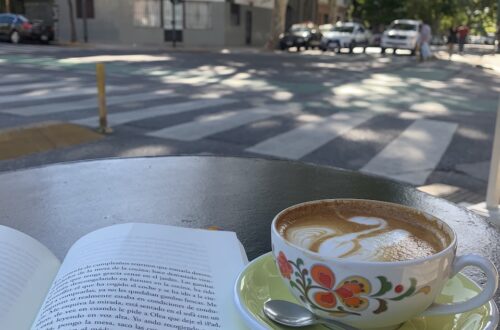If there’s one skill I’d love to master in my life, it’s the art of decision making. I’ve wasted plenty of time agonizing over what to do next or freaking out about whether I’m on the right path. For a while, I was the queen of quarter life crises (yes, plural) until I started carving out time to get clarity in my life.
I’m from the cornfields of Indiana so bear with me for a minute while I get all Small Town metaphorical up in here.
Let’s say, for the purpose of this article and for some fun, that you’re lost in the middle of nowhere. You’re at a four way stop just sitting in the bed of your truck, looking up at the sky and listening to the birds chirping in the fields around you.
There’s a city nearby, let’s call it Clarity, with a transportation hub – a bus system, a train, a gas station, a diner, and a general store with a payphone. You need to get there before you can get anywhere else.
But you don’t know which way Clarity is.
So you just keep on cloud watching, twiddling your thumbs, fussing with the radio, and staying put at your four way stop, surrounded by endless ears of corn and the same old same old.
You can’t get where you want to go until you get to Clarity. Clarity gives us direction.
Here are some ways to activate your ability to reroute so that you can put the car in drive and get clarity in your life.
Do a Life Audit
In alcoholics anonymous, the saying “All progress starts by telling the truth” is the tipping point for course correcting. You can’t fix a problem, or various problems, if you don’t acknowledge its existence. So take a minute to sit down and really think about what’s working in your life and what isn’t right now.
I love Dr. Benjamin Hardy’s YouTube videos (this one and this one) on this topic. He suggests doing some Extreme Honesty Journaling and just writing down bullet points about everything and anything that’s going on in your life. This can be nice and messy, the point is just to get it all out. Think stomach flu, journaling edition.
You could also print off one of these Wheels of Life if you’d like. The areas I’d recommend looking at are Love Life, Social Life, Finances, Career, Fulfillment/Purpose, Health, Hobbies and Spirituality.
Slow Down By Building in Some Daily Habits
We often feel unable to get clarity because we don’t give ourselves time to properly think. Or we’re afraid to really transfer our thoughts onto a sheet of paper and take a hard look at them because that will mean we have to freakin’ do something about them.
Part of the problem is how little time we give ourselves to, well, do nothing. In the US at least, the “time is money” philosophy reigns supreme, and being busy tends to equate doing important things. This is a flawed way of thinking but many people buy into it.
What’s even more valuable than putting in time to make money, is making time to separate ourselves from all pressure to perform, respond, or do anything with a desired outcome. This time is the most precious and valuable of all because it allows us to know ourselves better.
Here are some of the best ways to create this mental white space. Incorporate all of them into your daily routine if you’d like, but at least choose one and let yourself disconnect from all distractions and connect to your inner voice.
Go for a walk
In a world where we spend so much time staring at two-dimensional screens, it’s increasingly important for your mental health to power down and take a power walk. Or a slow stroll. Heck, you can even prancercise.
If possible go to a park or area where you can be immersed in nature. It’s simply good for your soul. Take a time out from music, podcasts or other inputs, put your phone on airplane mode and just walk. Walk and let your mind reset itself. This can work wonders for your mental clarity if you make it a non-negotiable habit.
Read also: The Best YouTubers for Spirituality and Self-Development
Meditate or pray
You can do either or you can do both. Whether you’re a religious person or not, sitting still and connecting to either your inner being or a higher power, is the best way to receive guidance and separate your voice from the voices of those around you. Even a five minute meditation practice, if you implement it every day, can create transformational results. The goal here is to observe your thoughts, quiet your mind, and see what insight or feelings come through. If you’re not sure how to do this, start with a guided meditation on YouTube.
Journal for five to ten minutes daily
They say we have about 70,000 thoughts per day and about 90% of them are carried over from the day before. We need to actively address what it is we’re thinking and see whether those thoughts are truly useful when it comes to getting where we want to go. Spoiler alert: usually they’re not.
By journaling, you get to empty your mind, put those thoughts onto a piece of paper without any judgment, and ideally, write down some thoughts you’d like to think instead. This act of emptying your mind can leave you feeling lighter and allow you to let in more positive thoughts, diluting the negative. Out with the old and in with the new, baby.
I also feel that journaling is one of the best ways to see how we progress and more importantly, to understand ourselves. It’s an honest way to capture the essence of who you are at a particular moment in time. And it’s only for you. That’s the beautiful part.
Read also: Rewiring Your Identity in 10 Minutes a Day
Think about your values and your triggers
What three things are most important to you right now at this time in your life? For me, my top value is my freedom. I’ve never been able to get down with the idea of trading my time for money. If I can finish the work in an hour, why do I have to sit in the chair for eight? This immense desire to control my time, schedule, and life path, drove me to become a freelancer. Which allows me to pursue my other values: adventure and purpose.
Often our values and priorities are closely linked and this may alter dramatically from one stage of your life to another. I’m certain that in five years or so, I’ll be more interested in having a family, which will surely substitute adventure (but will be an adventure of its own:)).
On the other hand, your values may or may not correspond with your triggers.
What makes you mad? Do you get huffy when the meeting goes ten minutes over? Do you hate making small talk? Do you bite your tongue when your friends complain about their problems and then refuse to do anything about them?
The things that grind our gears can also give us pertinent information about ourselves. For example, I get very upset when people take advantage of my time, or when I people please instead of turning down invites, because I know my time is something I can’t get back. Like I said earlier, this has motivated me to become a freelancer so I can decide when I work, how I work, where I work, and for whom I work.
It may be helpful to journal about these two questions – What are my values? What are my triggers? – and see what comes up for you. If you take time to get to know yourself better, you can start to make your life easier and more enjoyable.
Give Yourself a Time Limit
If you’re looking to gain clarity on a particular subject in your life, you can very well carry on with the process for ages, dragging it out so that you don’t have to make a decision.
This is the opposite of what you want. Not making a decision is still a decision and it drags you right into the confusing quick sands of default mode. Don’t let this happen.
If you’re trying to make a decision, give yourself a timeline. Maybe it’s two days. Maybe it’s a week. Don’t make it more than two. Carve out time to do the above activities and then schedule time to sit, look over whatever it is you’d like to look over, and make a choice.
Decision making is powerful. It leaves you feeling lighter and gives you a direction. If you’re interested in learning more, check out this podcast from The Life Coach School on “Decision Debt.”
Read also: The Vibrational Piggy Bank: A Strategy for People Who Have Trouble Saying No
Make a Goal & Commit
You have to have a goal. Period. Your goal is your compass. Your atlas. Your GPS. It tells you the next step to take so that you get closer and closer to your goal. If you don’t have a goal, you can make moves but they’re only going to take you in circles.
Sometimes you have to choose a goal before you’re really certain what it is you want. We learn by doing. Action stimulates us and gives us information about ourselves. It provides feelings, which are our internal guidance systems.
You can talk all day long about how you’d like to learn how to do Graphic Design or play the piano or write screenplays, but until you open up Photoshop, sit down at a baby grand, or start creating your three act structure in FinalDraft, you’re not going to know how the heck it truly makes you feel.
Choose the goal that feels the most exciting to you, figure out the steps you need to take, and get moving.
If you end up needing to reroute, you can always do so. But you won’t know until you’ve put the car in drive.
Some other articles I love on this topic:





